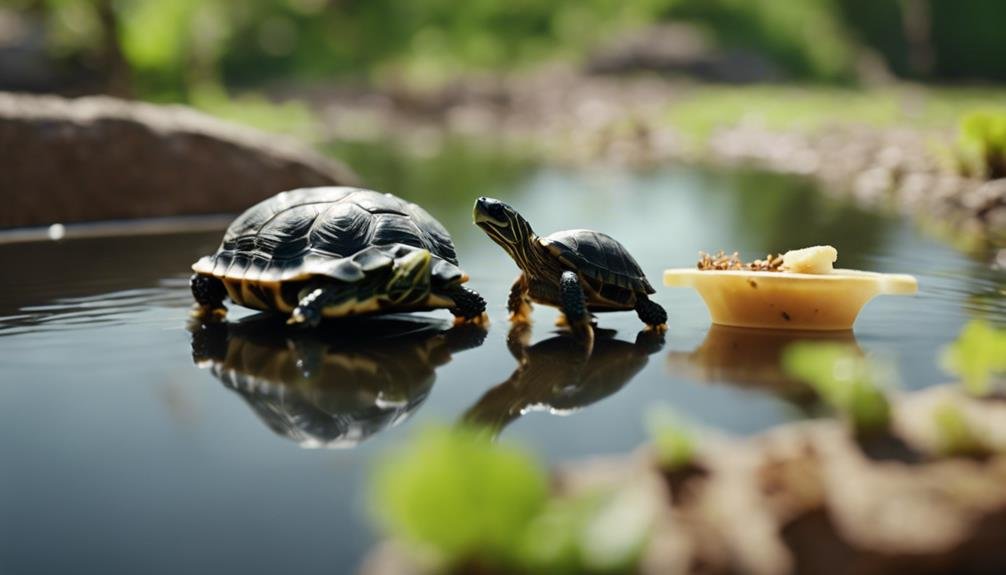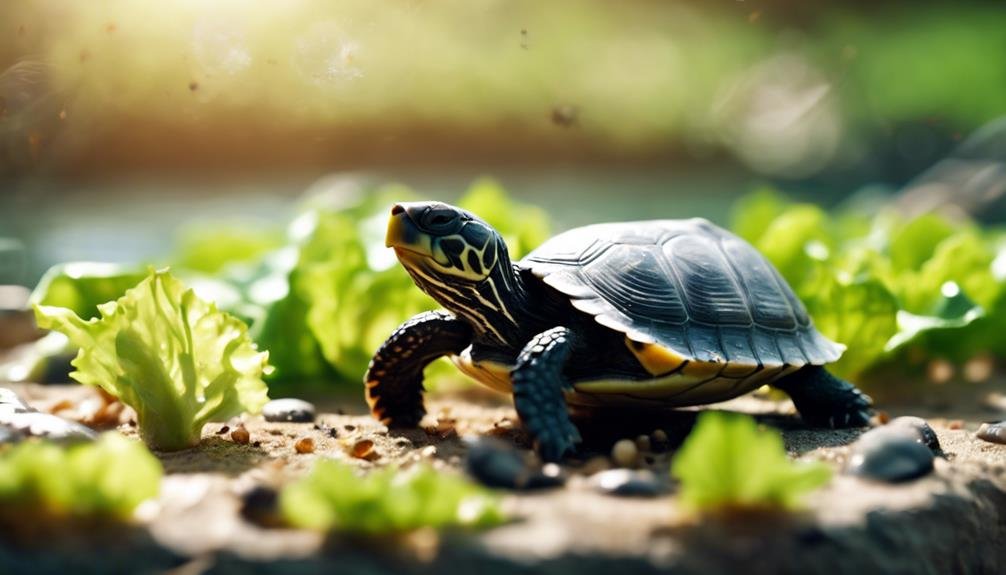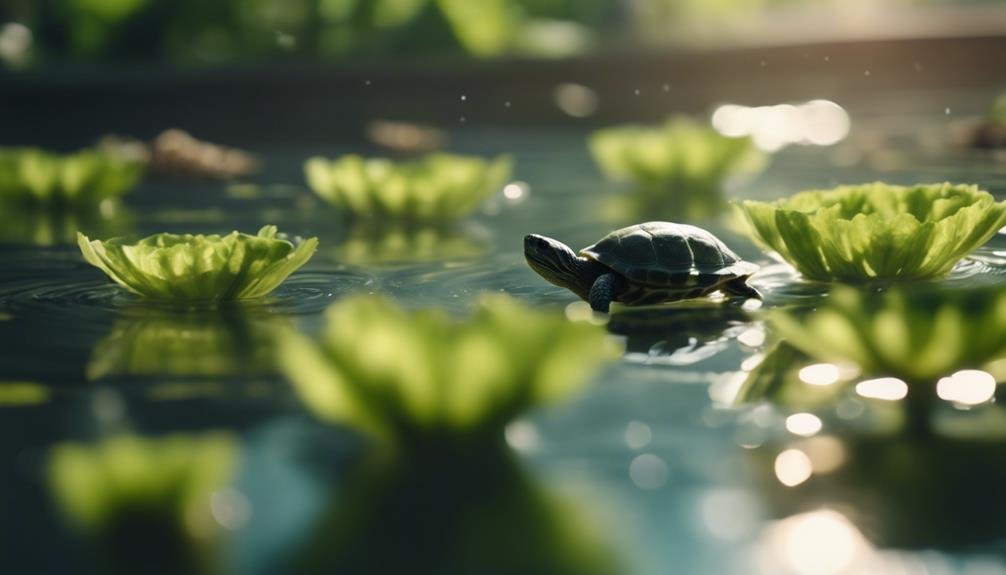When you start caring for a baby turtle, you’ll quickly realize their diet isn’t just about tossing in a few flakes of turtle food and calling it a day. You need to balance commercial food with items like leafy greens and occasional protein sources such as feeder fish or crickets. Ensuring they get the right mix of nutrients, including vitamin D from natural sunlight, is critical for their growth and shell development. However, it’s not just what you feed them but how you feed them that can set the stage for their health. Are you aware of the common pitfalls many new turtle owners fall into?
Key Takeaways
- Baby turtles primarily eat commercial turtle food enriched with essential vitamins and minerals.
- They consume fresh vegetables like romaine lettuce and cabbage for nutrients.
- High-protein foods such as feeder fish and crickets are vital for their growth.
- Regular exposure to natural sunlight aids in vitamin D synthesis, crucial for health.
- Monitoring and adjusting their diet is important to prevent overfeeding and ensure balanced nutrition.
Types of Baby Turtle Diets
Baby turtles thrive on a diet rich in both commercial turtle food and fresh vegetables, tailored to boost their growth and health. As you’re setting up a feeding regime, remember that baby turtles eat a mix of chopped fresh food like romaine lettuce and cabbage, important for their development. These should be cut into tiny pieces to make it easier for them to consume and to prevent the risk of choking.
Incorporating feeder fish and crickets into their diet is essential, as these provide the high protein intake they need during their early stages. You’ll find that monitoring feeding habits closely ensures they aren’t over or under-eating, which can be critical to their wellbeing.
Don’t forget the importance of natural sunlight. Exposure to sunlight facilitates the synthesis of vitamin D, essential for healthy shell and bone development. If natural sunlight isn’t feasible, especially during the winter months, consider UV lamps as an alternative to keep their vitamin D levels at an optimal level.
Always observe how your baby turtles are responding to different types of food and adjust their diet accordingly. Regular consultations with a vet can also help tailor their dietary needs more precisely, ensuring they grow up healthy and strong.
Essential Nutrients and Supplements
While setting up a well-rounded diet, it’s also important to focus on the specific nutrients and supplements that support the health of baby turtles. As you explore what baby turtles eat, remember that essential nutrients like protein, calcium, and vitamin D are essential for their best growth and development. Protein is important for muscle and overall growth, while calcium and vitamin D are indispensable for strong bone and shell formation.
Commercially prepared baby turtle food can be a great source as it often contains these necessary vitamins and minerals tailored to meet their specific dietary needs. However, don’t rely solely on processed foods; incorporating fresh leafy vegetables such as romaine lettuce and cabbage can boost their intake of natural nutrients.
Supplementing their diet is also important. Calcium supplements are especially critical to prevent shell deformities and ensure proper bone health. Similarly, adequate vitamin D is essential for calcium absorption and overall health. Ensuring a balanced diet supplemented with these key nutrients will help your baby turtles thrive and maintain robust health. Always consult with a vet or a turtle care specialist to tailor the diet and supplements according to your specific baby turtle’s needs.
Common Feeding Mistakes


When feeding your baby turtles, common mistakes such as overfeeding or offering an unbalanced diet can seriously hinder their health and development. Overfeeding can lead to obesity and shell deformities, which aren’t just cosmetic issues but can impact their overall health and mobility. Similarly, an unbalanced diet that lacks essential nutrients can stunt their growth and lead to developmental problems.
It’s vital to provide a variety of food to avoid nutritional deficiencies. Relying on a single type of food can’t meet all their dietary needs. Additionally, be mindful of the size and type of the food you give. Inappropriate food items, whether too large or not suitable for turtles, can cause choking or digestive issues.
You must monitor feeding habits closely to make sure your baby turtles are eating properly and thriving. Neglecting this aspect of their care can result in long-term health complications. Paying attention to what and how much they eat, and making adjustments as needed, is key to raising healthy baby turtles. Don’t underestimate the importance of a balanced diet and proper feeding practices.
Scheduling Feeding Times
Understanding the importance of a balanced diet, it’s also necessary to focus on how often you feed your baby turtles. You should feed them two to three times daily to make certain they meet their nutritional needs and support their growth. Consistency in feeding times not only helps in maintaining their feeding habits but also plays an essential role in their overall health.
Adhering to a schedule helps your baby turtles anticipate feeding times, which can reduce stress and aid in digestion. Remember, leaving food in the tank for only 30 minutes and then removing any leftovers is vital to keep the habitat clean and prevent health issues.
To evoke the emotional aspect of nurturing these delicate creatures, consider the following schedule:
| Time of Day | Amount | Note |
|---|---|---|
| Morning | Small | Start with vitamin supplements |
| Midday | Moderate | Monitor their appetite |
| Evening | Small | Observe how much they consume |
This table illustrates a caring and structured approach to feeding, ensuring your baby turtles thrive. Adjustments might be needed based on their response, so keep a watchful eye on their eating patterns and adjust as necessary.
Do Turtles Need a Different Diet During Mating Season?
During mating season, it’s essential to consider how turtles mate when deciding on their diet. Some species may require additional nutrients and energy during this time to support reproduction. It’s important to understand their natural behaviors and dietary needs to ensure they stay healthy and reproductive.
Hydration and Health Care


To ensure your baby turtles stay healthy, it’s vital to maintain their hydration by placing them in a shallow dish of water every 4-5 days. Hydration isn’t just about quenching thirst; it plays a pivotal role in several critical areas of their development and health.
Here are some key reasons why keeping your baby turtles hydrated is important:
- Shell Development: Adequate hydration contributes greatly to the proper growth and strength of your turtle’s shell.
- Digestion: Regular water access is important to help with the digestion of food, ensuring that your turtles can absorb and process nutrients effectively.
- Dehydration Prevention: Staying hydrated helps prevent the risks associated with dehydration, which can lead to severe health issues.
- Skin Health: Even if they aren’t drinking, being in a moist environment can benefit their skin, keeping it supple and healthy.
Conclusion
To guarantee your baby turtles thrive, it’s important to provide a varied diet of commercial food, fresh veggies, feeder fish, and crickets. Remember, they also need plenty of natural sunlight for vitamin D.
Keep an eye on their eating patterns to avoid overfeeding or undernutrition. Stick to a regular feeding schedule, offer fresh water daily, and monitor their health closely.
By following these guidelines, you’re setting your baby turtles up for a healthy start in life.


